This article was medically reviewed by Luba Lee, FNP-BC, MS. Luba Lee, FNP-BC is a Board-Certified Family Nurse Practitioner (FNP) and educator in Tennessee with over a decade of clinical experience. Luba has certifications in Pediatric Advanced Life Support (PALS), Emergency Medicine, Advanced Cardiac Life Support (ACLS), Team Building, and Critical Care Nursing. She received her Master of Science in Nursing (MSN) from the University of Tennessee in 2006.
There are 15 references cited in this article, which can be found at the bottom of the page.
wikiHow marks an article as reader-approved once it receives enough positive feedback. This article received 172 testimonials and 95% of readers who voted found it helpful, earning it our reader-approved status.
This article has been viewed 1,980,955 times.
Creatinine is a waste product found in everyone's blood and urine. Creatinine and creatinine clearance tests tell how well your kidneys are working. Under normal circumstances, your kidneys should be able to filter and pass this substance out of your body. Certain health problems can hinder this function, however, allowing harmful amounts of creatinine to build up. There are several ways that you can reduce your creatinine levels, including changing your diet, making some lifestyle modifications, taking medications, and participating in medical therapy.
Steps
Understanding Creatinine
-
1Know what creatinine is. Creatinine is a waste product produced by the body when creatine, a metabolism substance that helps convert food into energy, breaks down.
- Usually, your kidneys help filter creatinine out of the blood. The waste product is then passed out of the body via urine.
- High creatinine levels can indicate a problem with your kidneys.
- High creatinine levels can be the result of regularly consuming a high amount of protein or partaking in strenuous exercise.
- Creatine supplements may also increase levels of creatinine in blood and urine.
-
2Understand how the test works. A creatinine test measures how much creatinine is in your blood.
- Your doctor may also perform a creatinine clearance test, which measures the amount of creatinine in your urine. The amount in your blood should be low, and the amount in your urine should be high.
- These tests only provide a "snapshot" of your kidney health. They only measure the amount of creatinine in your blood and urine from one-time samples taken within the past 24 hours.
Advertisement -
3Interpret your results. The normal range for creatinine levels will vary based on whether you are an adult male, adult female, teenager, or child. The value you should be at may vary further based on your age and body size, but there are general ranges you should shoot for.
- Normal blood creatinine levels are:[1]
- Men: 0.6 to 1.2 mg/dL; 53 to 106 mcmol/L
- Women: 0.5 to 1.1 mg/dL; 44 to 97 mcmol/L
- Teenagers: 0.5 to 1.0 mg/dL
- Children: 0.3 to 0.7 mg/dL
- Normal urine creatinine levels are:
- Men: 107 to 139 mL/min; 1.8 to 2.3 mL/sec
- Women: 87 to 107 mL/min; 1.5 to 1.8 mL/sec
- Anyone above the age of 40: levels should drop by 6.5 mL/min for every additional 10 years of age
- Normal blood creatinine levels are:[1]
-
4Understand why increased creatinine levels occur. There are several different reasons why you might have increased creatinine levels; some of these conditions are more severe than others, but all mean that you need to take steps to get your creatinine levels back to normal.
- Renal failure or impairment: If your kidneys are damaged, they cannot filter creatinine out of your body through glomerular filtration as they are supposed to. Glomerular filtration is the outflow of filtered fluid passing through your kidney.
- Muscle destruction: If you have a condition that causes the breakdown of your muscles, the broken down muscle tissue can get into your bloodstream and impair your kidneys.
- High intake of meat: Eating a diet rich in cooked meat can increase the amount of creatinine in your body.
- Hypothyroidism: Having a dysfunction in your thyroid gland can have an influence on your kidney function. Hypothyroidism can decrease your kidneys’ ability to properly filter waste out of your body.
Using Unverified Herbal Remedies
-
1Drink herbal tea or Green tea. Certain types of herbal tea are believed to help lower the amount of creatinine in your blood. Studies supporting this benefit are limited, but the theory has not been disproved, either.
- Drink around two 8-oz (250-ml) glasses of herbal tea each day.
- Herbal teas worth checking out include chamomile, nettle leaf, dandelion root.
- The idea is that these teas stimulate the kidneys and cause an increase in the production of urine. As such, more creatinine can be passed out of the body.
-
2Consider taking nettle leaf supplements. Nettle leaf may help to increase your renal excretion, with will help to eliminate excess amounts of creatinine.[2] Nettles contain histamines and flavonoids, which can help to increase the blood flow to your kidneys, thus increasing urine filtration.
- Nettle leaves can be taken in the form of supplements or can be made into tea.
-
3Talk to your doctor about salvia. Salvia is an herb that may increase your glomerular filtration rate, which helps to facilitate the elimination of creatinine. [3] Salvia contains lithospermate B, which helps to promote renal function.[4]
- Set up a meeting with your doctor to discuss the possible use of salvia. Do not take salvia without consulting your doctor.
Making Lifestyle Changes
-
1Watch your fluid intake. As a general rule, you should drink six to eight 8-oz (250-ml) glasses of water each day. Dehydration can actually cause your creatinine levels to increase, so staying hydrated is important.
- When you do not have enough fluid in your body, you produce less urine. Creatinine is washed out of your system through urine, so producing less urine will make it more difficult to flush out this toxin.
- On the other hand, consuming too much fluid could also have a negative effect on your kidney functions. Too much fluid could cause an increase in blood pressure, and high blood pressure can put stress on your kidneys.
- Unless otherwise instructed by a doctor, it is best to keep yourself hydrated but to avoid abnormal amounts of fluid intake.
-
2Restrict your activity level. The body converts food into energy faster when it undergoes vigorous exercise. As a result, more creatinine is formed, causing the amount of creatinine build-up in your blood to increase.
- Exercise can still offer important health benefits overall, so you may not want to exclude it from your routine completely. You should swap out high intensity exercises for low intensity ones, however. Instead of running, weight lifting, or playing basketball, try walking or practicing yoga.
-
3Sleep well. When you sleep, most of your bodily functions decrease. This includes the body's metabolism. As a result, the conversion of creatine to creatinine goes at a slower rate, allowing more of the creatinine already in your blood to filter out before additional toxins can build up.
- Aim for six to nine hours of sleep per night, with seven or eight being an ideal amount.
- Additionally, sleep deprivation can put physical stress on your entire body and force all of its parts to work harder to perform normal tasks. As a result, your kidneys can become stressed, which will decrease their ability to filter out creatinine.
Taking Medications
-
1Ask your doctor about stopping certain medications. There are some medications that have been associated with high creatinine levels. Medications that can damage the kidneys pose a possible threat, but some medications used to treat kidney disease can also cause a problem.
- If you already have kidney problems, be cautious about medications, like ibuprofen, that can cause further kidney damage when used regularly.
- ACE inhibitors and cyclosporine are both used to treat kidney disease but may cause creatinine levels to rise.[5]
- Some nutritional supplements, like vanadium, can also cause an increase in creatinine levels and should be avoided.
- Always talk to your doctor before stopping any medication. While some of these medications may cause creatinine to rise, the good could still outweigh the bad depending on why those medications were prescribed to begin with.
-
2Check into medications and supplements that may help. Depending on the underlying cause of your elevated creatinine levels and on your overall health, your doctor may advise you to include certain medications or supplements to bring those levels down.
- Most medications that treat creatinine levels also treat an underlying problem causing an increase in those levels, so your doctor will have to diagnose the underlying condition before you can determine which medication is right for you.
-
3Take diabetes medications to control your blood sugar. One common cause of kidney damage, and thus elevated creatinine levels, is diabetes. If you have diabetes, it is very important to keep your insulin levels normal to prevent further kidney damage. There are certain medications that you can take to do this.
- Repaglinide is a commonly prescribed for diabetes. The starting dose is normally 0.5 milligrams, administered before each meal. The maximum dose is 4 milligrams, also administered before a meal. Even if you happen to skip a meal, it is important to administer the drugs.[6]
-
4Lower your blood pressure with medication. Aside from diabetes, hypertension is another factor that can contribute to kidney damage. Keeping your blood pressure under control will also help to prevent further damage to your kidneys, thus helping to lower your creatinine levels.
-
5Some antibiotics can be dangerous if taken incorrectly. People with kidney disease need to take smaller amounts of antibiotics than people with healthy kidneys.
-
6Take medications targeted high creatinine levels. Ketosteril is often prescribed to reduce levels of creatinine found in the bloodstream. Talk to your doctor about this medication and if it may be right for you. The regular dose is generally 4 to 8 tablets taken three time a day, at each meal.[9] Other creatinine lowering drugs include:
- Alpha lipoic acid (antioxidants) supplements can be used to help energize the kidneys and neutralize toxins, including creatinine. You can usually take around 300 mg each day.[10]
- Chitosan is a weight management supplement that can also reduce the amount of creatinine in the blood. Benefits are usually reached when you take between 1000 and 4000 mg per day.
Considering Medical Therapies
-
1Address and treat the underlying problem. High creatinine levels are rarely an independent problem. More often than not, this issue is a symptom of something more serious. To drop the levels permanently and improve your overall health, work with your doctor to find the underlying problem and remedy that.
- Kidney damage and chronic kidney disease are the most common causes. This damage can be caused by illness, potentially fatal infections, shock, cancer, or low blood flow.
- Type 2 diabetes is also linked to high creatinine levels.
- Other possible causes include heart failure, dehydration, excessive blood loss leading to shock, gout, physically strenuous exercise, muscle injuries, muscle disorders, and burns.
-
2Research cold laser therapy. Some evidence suggests that cold laser or low level laser therapy can revitalize the kidneys and improve their overall functioning abilities. As a result, your kidneys become more capable of filtering out creatinine naturally.[11]
- When used on the adrenal glands above the kidneys, cold lasers can also help reduce stress and improve sleep.
- When used on the Vagus nerve in your neck, cold lasers may help improve the circulation of blood to various organs, including the kidneys.
-
3Use massage therapy. Massage therapy also will help blood circulation and reduce stress levels, which leads to pleasant sleep and relaxation.
-
4Learn about blood purification therapy. While somewhat uncommon, someone who has severe kidney damage and consistently high creatinine levels may wish to consider blood purification therapy, a.k.a. hemodialysis or dialysis. The therapy is a bit extreme, but it can be very effective.
- During the treatment, your blood will be extracted and filtered through a machine. This machine removes creatinine and other toxins in the blood. Once cleaned, the blood is circulated back into the body.[12]
-
5Consider dialysis as a final option. If diet changes and medication do not lower your creatinine levels, talk to your doctor about dialysis. There are two types of dialysis, but the one used to lower creatinine levels is called hemodialysis.[13]
- Hemodialysis involves using a machine to filter out waste, fluid, and salt from your blood so that your damaged kidneys do not have to.
Making Diet Changes
-
1Limit your sodium intake. Excessive sodium can cause an unhealthy amount of fluid retention and may result in high blood pressure. Both of these issues could result in high creatinine levels.
- Maintain a low-sodium diet. Stay away from salty foods and drinks, and opt for low-sodium versions of common food products (canned soup, bottled sauces, etc.) when available.
- Your daily average range of sodium intake should be between 2 to 3 grams per day, if not lower.[14]
-
2Keep an eye on your protein intake.[15] Avoid foods that are rich in protein as much as possible. Red meat and dairy products can be especially bad for you.
- Dietary sources of creatine are most commonly obtained through animal products. While these amounts are not usually harmful, they can pose a problem for someone already dealing with abnormally high creatinine.
- Note that you do need protein in your diet to maintain adequate amounts of energy and keep your bodily functions running smoothly, so you should not cut it out completely.
- When you do consume protein, try to obtain it from plant-based sources, like nuts and other legumes.
-
3Increase your consumption of plant-based foods. Vegetarian diets are often recommended to bring down high levels of creatinine and reduce the risk of kidney disease due to high blood pressure or diabetes. Eat foods rich in vitamin C such as berries, lemon juice, parsley and cauliflower.
-
4Avoid phosphorus-rich foods. Your kidneys may have a hard time processing phosphorus-rich foods, particularly if you have high creatinine levels.[16] Because of this, you should try to avoid foods like:
- Pumpkin and squash, cheese, fish, shellfish, nuts, pork, low fat dairy products, and soybeans.
-
5Limit the amount of potassium you consume. When dealing with kidney issues, try to avoid eating foods with a high amount of potassium because that potassium can accumulate in the body if your kidneys cannot process it correctly. Foods that are rich in potassium include:
- Dried fruits, bananas, spinach, potatoes, beans, and peas.
-
6Stay away from creatine supplements. Since creatinine is a waste product of creatine, taking creatine supplements will result in a greater build-up of creatinine in your blood.
- For the average person, this is not much of an issue. If you are an athlete or bodybuilder taking nutritional supplements to improve your performance, though, creatine might be included in these supplements and should be cut out.
Expert Q&A
Did you know you can get expert answers for this article?
Unlock expert answers by supporting wikiHow
-
QuestionHow can I adjust dietary intake to best decrease levels of creatinine?
 Luba Lee, FNP-BC, MSLuba Lee, FNP-BC is a Board-Certified Family Nurse Practitioner (FNP) and educator in Tennessee with over a decade of clinical experience. Luba has certifications in Pediatric Advanced Life Support (PALS), Emergency Medicine, Advanced Cardiac Life Support (ACLS), Team Building, and Critical Care Nursing. She received her Master of Science in Nursing (MSN) from the University of Tennessee in 2006.
Luba Lee, FNP-BC, MSLuba Lee, FNP-BC is a Board-Certified Family Nurse Practitioner (FNP) and educator in Tennessee with over a decade of clinical experience. Luba has certifications in Pediatric Advanced Life Support (PALS), Emergency Medicine, Advanced Cardiac Life Support (ACLS), Team Building, and Critical Care Nursing. She received her Master of Science in Nursing (MSN) from the University of Tennessee in 2006.
Board-Certified Family Nurse Practitioner
-
QuestionHow can I tell if my creatinine levels are normal?
 Luba Lee, FNP-BC, MSLuba Lee, FNP-BC is a Board-Certified Family Nurse Practitioner (FNP) and educator in Tennessee with over a decade of clinical experience. Luba has certifications in Pediatric Advanced Life Support (PALS), Emergency Medicine, Advanced Cardiac Life Support (ACLS), Team Building, and Critical Care Nursing. She received her Master of Science in Nursing (MSN) from the University of Tennessee in 2006.
Luba Lee, FNP-BC, MSLuba Lee, FNP-BC is a Board-Certified Family Nurse Practitioner (FNP) and educator in Tennessee with over a decade of clinical experience. Luba has certifications in Pediatric Advanced Life Support (PALS), Emergency Medicine, Advanced Cardiac Life Support (ACLS), Team Building, and Critical Care Nursing. She received her Master of Science in Nursing (MSN) from the University of Tennessee in 2006.
Board-Certified Family Nurse Practitioner
Warnings
- Always consult a doctor before deciding on a course of treatment. Every individual has different health needs, so these guidelines may not work for everyone. Some could even cause a decline in overall health depending on your own specific circumstances.⧼thumbs_response⧽
References
- ↑ http://www.webmd.com/a-to-z-guides/creatinine-and-creatinine-clearance?page=3
- ↑ https://www.webmd.com/vitamins/ai/ingredientmono-664/stinging-nettle
- ↑ http://www.academia.edu/1542646/Volume_6_Number_4_2012_-_HealthMED_Journal
- ↑ http://circ.ahajournals.org/content/113/11/1393.full
- ↑ https://www.aafp.org/afp/2002/0801/p461.html
- ↑ https://www.medicinenet.com/repaglinide/article.htm
- ↑ http://www.rxlist.com/lotensin-hct-drug/indications-dosage.htm
- ↑ http://www.rxlist.com/lotensin-hct-drug/indications-dosage.htm
- ↑ http://www.mims.com/hongkong/drug/info/Ketosteril/?type=full
- ↑ http://www.drweil.com/drw/u/ART03051/AlphaLipoic-Acid-ALA.html
- ↑ https://www.ncbi.nlm.nih.gov/pmc/articles/PMC3505828/
- ↑ http://www.webmd.com/a-to-z-guides/kidney-dialysis
- ↑ Mahendra Agraharkar, Vasudevan Nair, et al. Recovery of renal function in dialysis patients, BMC Nephrol. 2003; 4: 9.
- ↑ https://www.cdc.gov/salt/pdfs/sodium_dietary_guidelines.pdf
- ↑ http://www.medicinenet.com/creatinine_blood_test/page2.htm
- ↑ https://www.mayoclinic.org/diseases-conditions/chronic-kidney-disease/expert-answers/food-and-nutrition/faq-20058408
About This Article
To bring down high creatinine levels, drink 6-8 glasses of water every day so your body is able to flush out excess creatinine. You can also try drinking an herbal tea or green tea twice a day, which may help reduce the amount of creatinine in your blood. If you're not a fan of tea, take nettle leaf supplements instead, which can have a similar effect on your creatinine levels. Also, try to get 7-8 hours of sleep per night since your body creates less creatinine while you're sleeping. To learn how to reduce your creatinine levels with medication, scroll down!
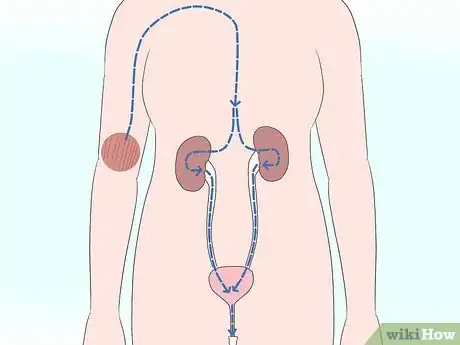
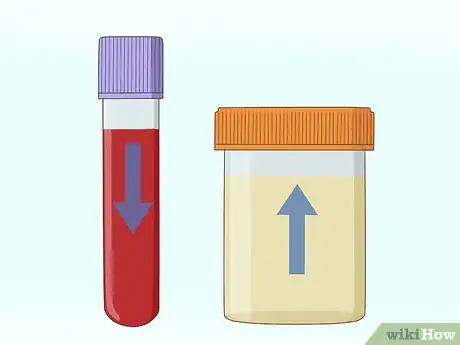
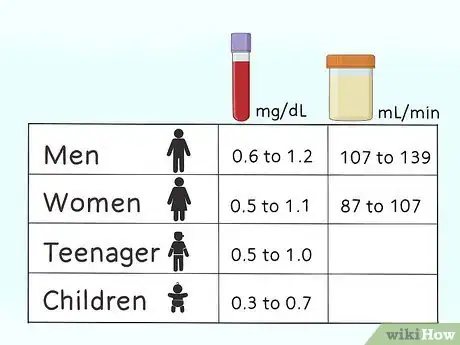
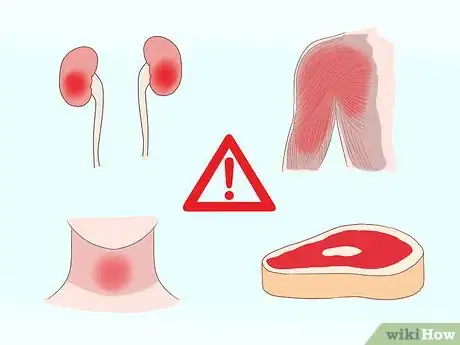
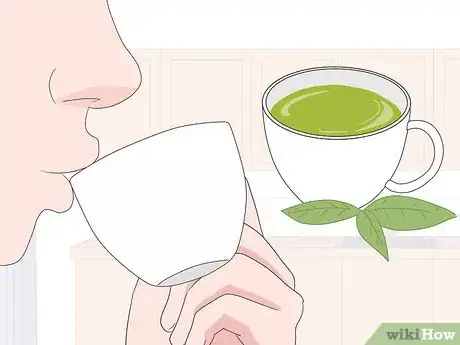
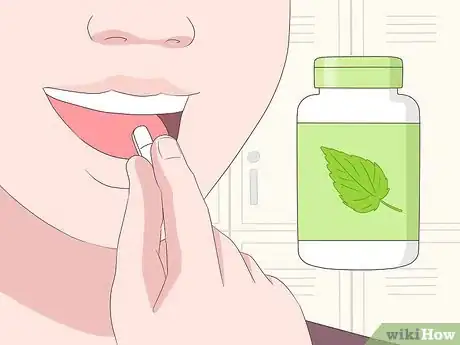
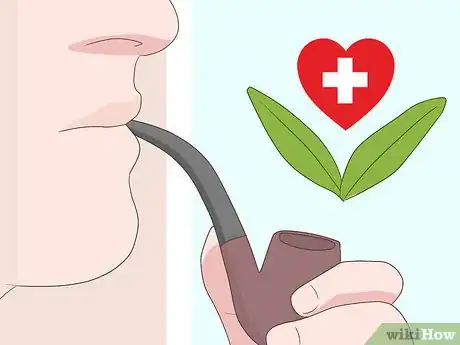
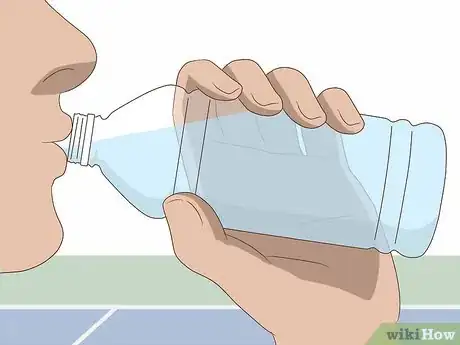
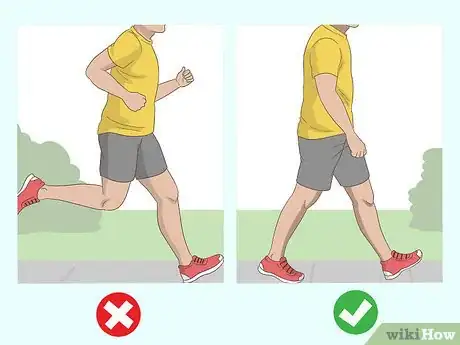
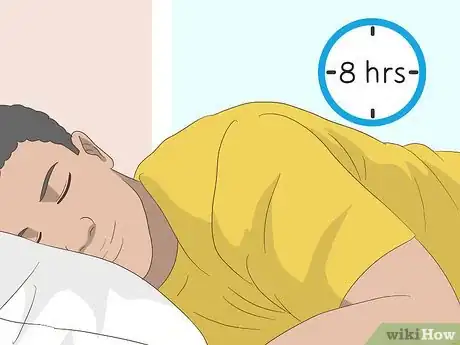
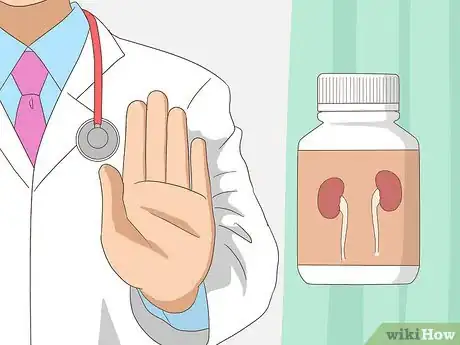
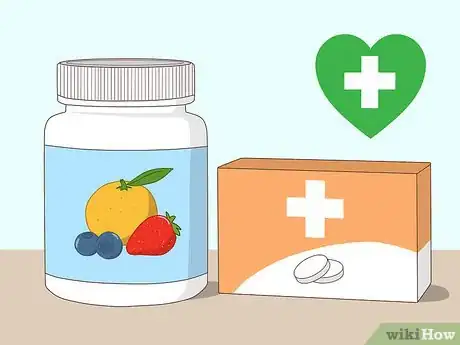
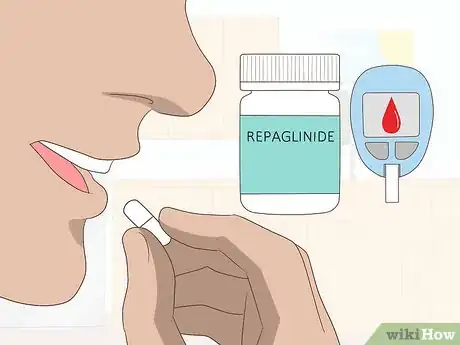
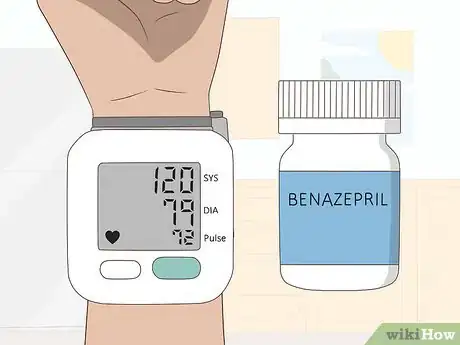
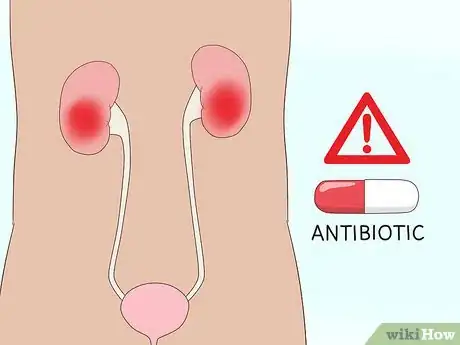
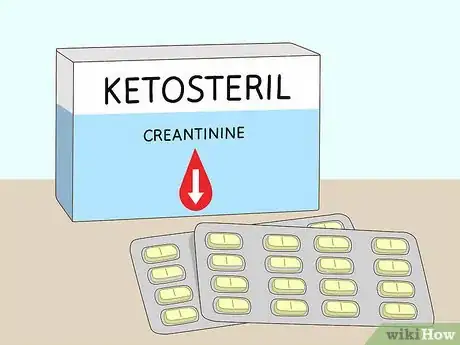
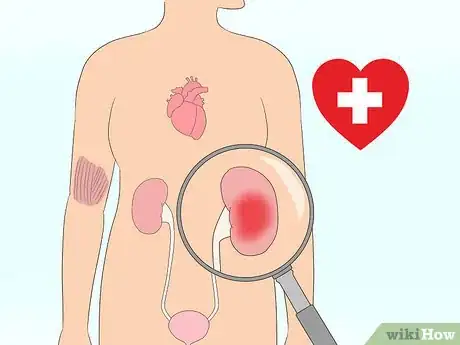
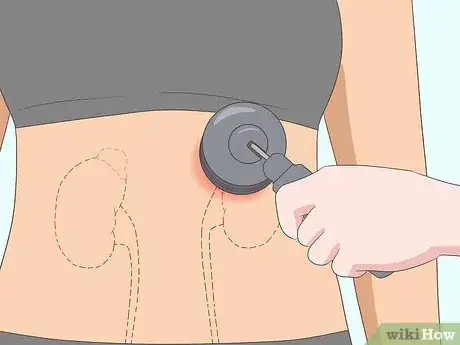
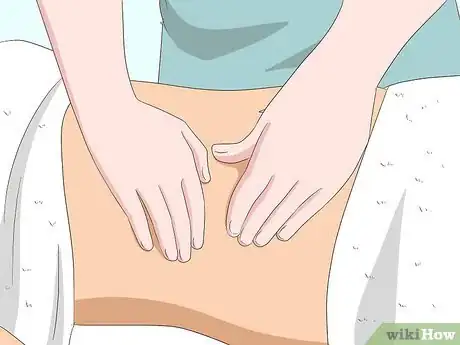
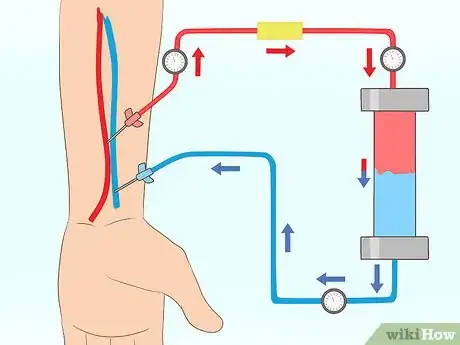
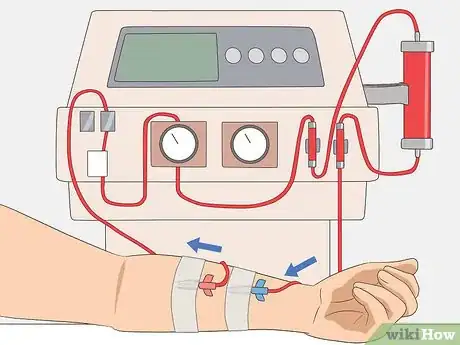
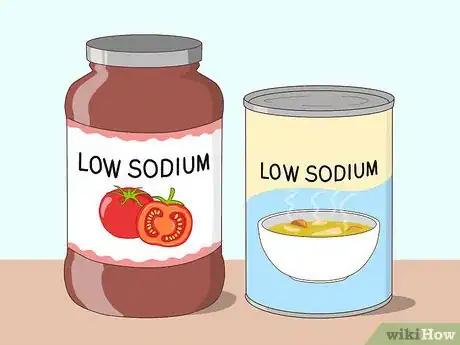
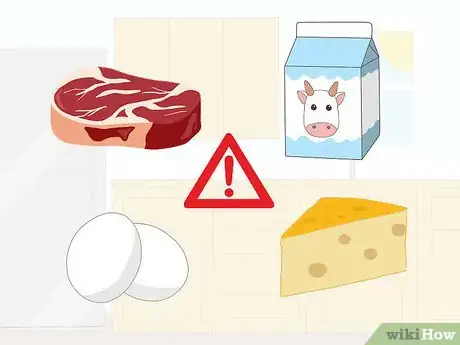
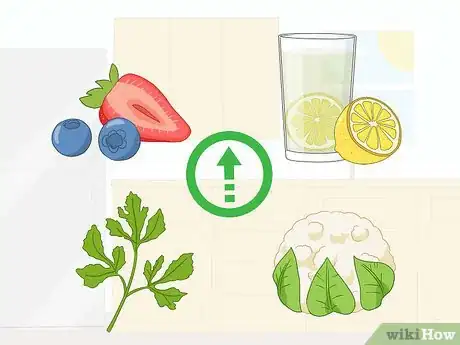
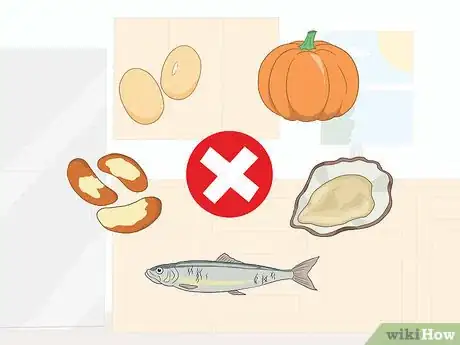
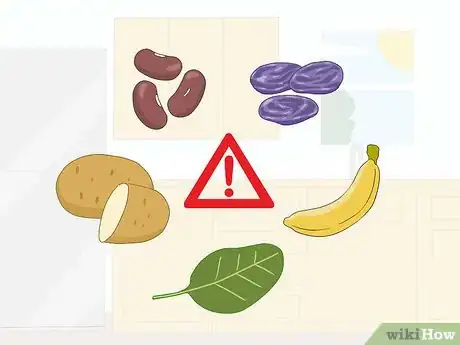
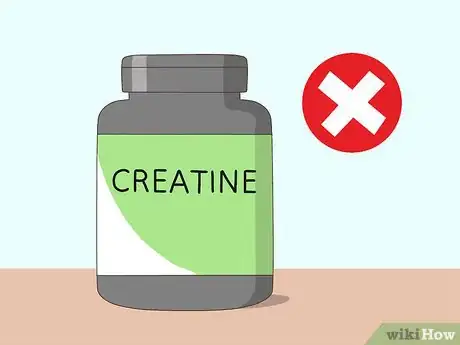





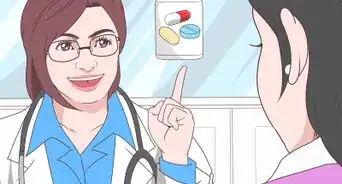



















































Medical Disclaimer
The content of this article is not intended to be a substitute for professional medical advice, examination, diagnosis, or treatment. You should always contact your doctor or other qualified healthcare professional before starting, changing, or stopping any kind of health treatment.
Read More...